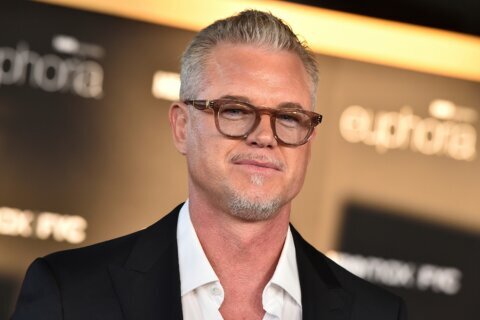WASHINGTON — The best movie in theaters right now isn’t a $250 million superhero tent-pole. It’s a $15 million sci-fi thriller, shot in just six weeks but sticking in your subconscious much longer.
“Ex Machina” follows a young computer programmer named Caleb (Domhnall Gleeson), who wins a trip to a remote mountain retreat inhabited by a reclusive CEO named Nathan (Oscar Isaac). Upon his arrival, Caleb is asked to participate in an experiment involving the world’s first artificial intelligence in the form of a beautiful robot named Ava (Alicia Vikander). Speaking through the glass of the interrogation room, Caleb’s mission is to determine whether Ava actually has consciousness.
Writer/director Alex Garland visited WTOP’s Glass Enclosed Nerve Center this week for a similar one-on-one chat behind the glass — but unlike the A.I. in his movie — he had the air of a Creator.
“I like sci-fi because you can put big ideas in it and not be embarrassed,” Garland tells WTOP.
While some filmmakers break into the industry by directing music videos, commercials or festival-winning shorts, Garland took a different path as a writer, penning the novel for Danny Boyle’s “The Beach” (2000), then writing the original screenplay for Boyle’s zombie flick “28 Days Later…” (2002).
“It wasn’t so much working with Danny, it was the whole thing,” Garland says.
“Working with a crew and working with actors. I enjoyed it. It was collaborative and I wanted to keep doing it.”
In his directorial debut, Garland shows a keen eye for the cinematic language. In one particular scene, Caleb knows a secret that Nathan doesn’t as the two engage in a conversation. Garland starts wide, then punches in for a close-up the second the secret is threatened. Viewers — who are in on the secret — literally feel the frame closing in on Caleb. All the while, an ominous animal skull hangs on the wall, watching with omniscient eyes in symbolic mise-en-scene.
“Typically, my process is block the scene with the actors, then turn to the D.O.P. and say, Rob (Hardy), how do you want to shoot it?” Garland says. “It’s often very informed by what the actors have done and the sort of vibe and where they’re putting (emotional) gear changes. And you say, OK, if we’re starting wide, maybe we start to push in slowly here or dolly in or whatever it happens to be.”
Garland’s entire filmmaking approach is articulated in a scene where Nathan gazes at a Jackson Pollock painting. He discusses the concept of “automatic art,” insisting that an artist shouldn’t plan too much ahead of time, but instead fluidly move across the canvas based on flexible instinct. If you plan each dot, he says, you might never put any dots on the canvas. In a way, this mirrors Nathan’s description of Ava’s evolved A.I. brain: “Impulse. Response. Fluid. Imperfect. Patterned. Chaotic.”
“I’ve got a clear idea in my head about what the scene is and why it’s there. With that knowledge, the trick then from my point of view is not to get too rigid, and to be able to hear what people are saying and suggesting and also be able to recognize what the actors are changing and adapting. So going with the flow to me is a very, very big part of it.”
In order to go with the flow, it’s vital to remember that film is a collaborative process.
“Where I’ve felt I’ve watched people go wrong before … is not really recognizing the collaboration,” Garland says.
“I think the rigidity often, in a way, looks like it comes from fear. You’ve got an idea, you’re feeling very anxious, and so you want to hold onto it, and you can’t open your mind to fluidity. A lot of my effort is to make sure I can hear a good idea when someone else suggests it.”
The one exception came with the film’s special effects, which needed a precise blueprint.
“One of the ways you can lose a lot of money in film production is to not be sure about what the VFX is,” Garland says. “This particular thing, we really needed to lock it down and feel very, very sure.”
“Ex Machina” features zero green screen; zero tracking markers. Garland simply shot each scene with Ava wearing a grey mesh over her entire body. The visual effects team then swapped out parts of her body — neck, abdomen, forearms and lower legs — with a metallic CGI.
Helping to sell the visual effects is the musical score, achieved with an instrument called a “celeste,” which creates an xylophone-style innocence à la “Close Encounters of the Third Kind” (1977).
“It has a kind of purity about it,” Garland says. “We can sort of associate it, in some ways, with nursery chimes, noises from childhood in some respects, a music box.”
Of course, all the audio and visuals in the world wouldn’t matter if the performance didn’t absolutely convince you that you were watching a figure of artificial intelligence. Vikander is a revelation, offering a hint of Edith Scob’s identity crisis in “Eyes Without a Face” (1960), Sean Young’s lust-for-life in “Blade Runner” (1982) and Samantha Morton’s pre-cog victimization in “Minority Report” (2002).
“It’s a film that puts a lot of pressure on actors,” Garland says. “First and foremost, we just needed top, quality actors. Once we had that, then I tried to give as much autonomy to the actors as possible to sort of inhabit the part. Alicia came up with a bunch of ideas about Ava … the way she’d move, which would not be robotic, it would be a kind of ‘too perfect’ version of the way humans move.”
Garland knew he had to cast her after seeing her in a Danish movie called “A Royal Affair” (2012).
“This young girl is sort of owning the movie, in some respects, and carrying these scenes on her shoulders. It’s always striking when you see that, so I knew she was an amazing actress,” Garland says. “We spoke and she reacted the script. She said some extremely perceptive things, and she put her reading of herself down on tape, and it was a kind of slam dunk.”
At times, Isaac is harder to read that Vikander — and intentionally so. In an early scene, Nathan tells Caleb about the so-called Turing Test, named after Alan Turing of “The Imitation Game” (2014). Caleb says, “If a human doesn’t know he’s interacting with a computer, the test is passed.” Immediately, Garland cuts back to a shot of Nathan, making us wonder if he is an A.I. himself.
“I know that a literate, sci-fi-familiar audience is going to start to suspect everything, because of the nature of this kind of story,” Garland say. “There are little nudges to sort of push people in that direction, like oddly-symmetrical scars on somebody’s back, a story about a car crash that seems slightly too convenient … Use the literacy of the audience almost as a plot-development technique.”
Other times, Isaac displays very human impulses of libido. He makes sure to include sexual sensors between his robots’ legs. He drinks booze until he passes out. He punches a body bag with the fury of testosterone. And he seeks a sort of casual fraternity with Caleb based on “bro” humor. It all culminates in a bizarre dancing sequence to rival “Pulp Fiction” (1994).
Contrary to release-date chronology, Isaac’s casting came independent of his acclaimed turns in the Coen Brothers’ “Inside Llewyn Davis” (2013), which Garland didn’t see until recently, and J.C. Chandor’s “A Most Violent Year” (2014), which shot after “Ex Machina” but hit theaters before.
“There is a thing that happens in the film industry where there is a lag,” Garland says of Isaac’s recent rise. “Everybody knows these guys are good, and then they land like two or three years later, and that’s something to do with the cycle of films.”
If acting streaks move in cycles, so do themes. Vikander’s female character comes off the heels of two other brilliant films dealing with women’s sexuality via technology: Spike Jonze’s “Her” (2013) and Jonathan Glazer’s “Under the Skin” (2014), both coincidentally starring Scarlett Johansson.
“I do believe in zeitgeist. … Why it happens and being able to anticipate what it’s going to be … that’s kind of like a dark art,” Garland says. “I suspect in the case of the A.I. stuff, it stems from a generalized anxiety and fear of tech. Tech companies, government agencies, the phones in our hand, the laptops in our office, and feeling that these things understand a lot about us and we don’t understand much about them. And that then gets transmuted and manifested as A.I. cautionary tales.”
Read that again. You’ll notice that Garland included “government agencies” in his analysis of our technological fears, which could shine light on which genre he tackles in future projects.
“I keep thinking of political thrillers at the moment,” Garland says. “‘Parallax View’ is fantastic, ‘All the President’s Men’ is fantastic, ‘Three Days of the Condor.’ I do like those ’70s paranoid, sort of post-Watergate conspiracy thrillers. … They’re kind of electrifying.”
While the genre gave us the investigative phrase “follow the money,” the era of the Hollywood Renaissance (1967-1980) was less obsessed with the bottom line, according to Garland.
“I think the ’70s is kind of a golden era of cinema. There was a period where adults made films for other adults, and then I think what increasingly happened, adults made films for kids,” Garland laments. “When I think of the ’70s films I really love … they’ve got mature themes, they’ve got complicated ethics, and they’re grey in all sorts of areas. They’re not primarily visceral entertainment, there’s some kind of agenda going on, and that could be ‘The Godfather’ or ‘Apocalypse Now.'”
Indeed, on the set of “Ex Machina,” Garland often referred to Isaac as Colonel Kurtz being “too far up the river,” spitting homespun philosophy with god-like aspirations. This peaks during an important conversation, where Caleb quotes J. Robert Oppenheimer’s creation of the atomic bomb: “I am become death, The Shatterer of Worlds.” Nathan replies, “One day the A.I.s are going to look back on us the same way we look at fossil skeletons on the plains of Africa. An upright ape living in dust with crude language and tools, all set for extinction.” This is the end, my friend.
If you liked the smell of napalm in the morning, you’ll love the scent of A.I. in the afternoon.








